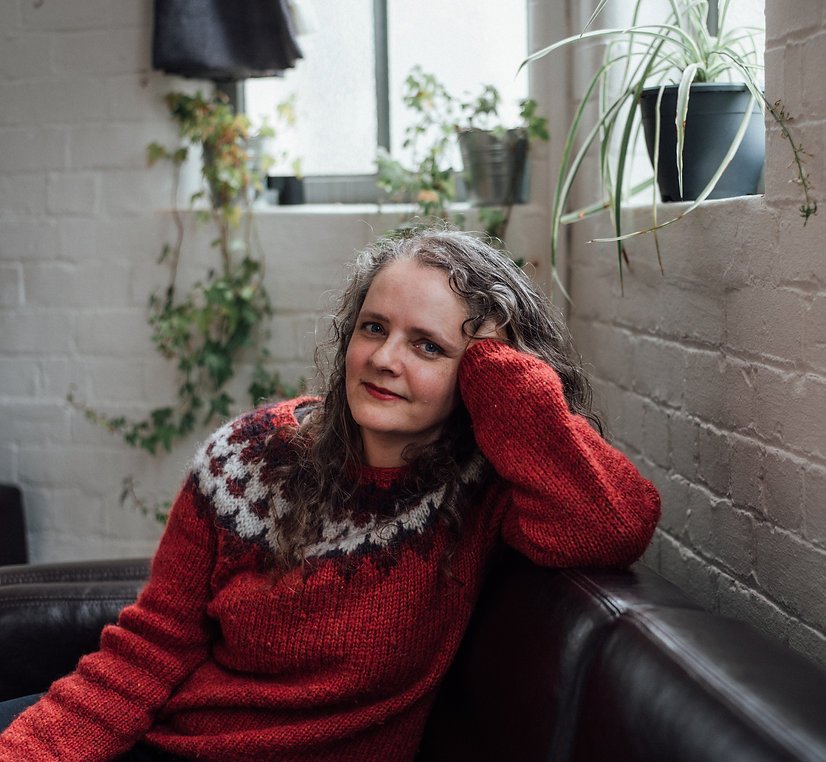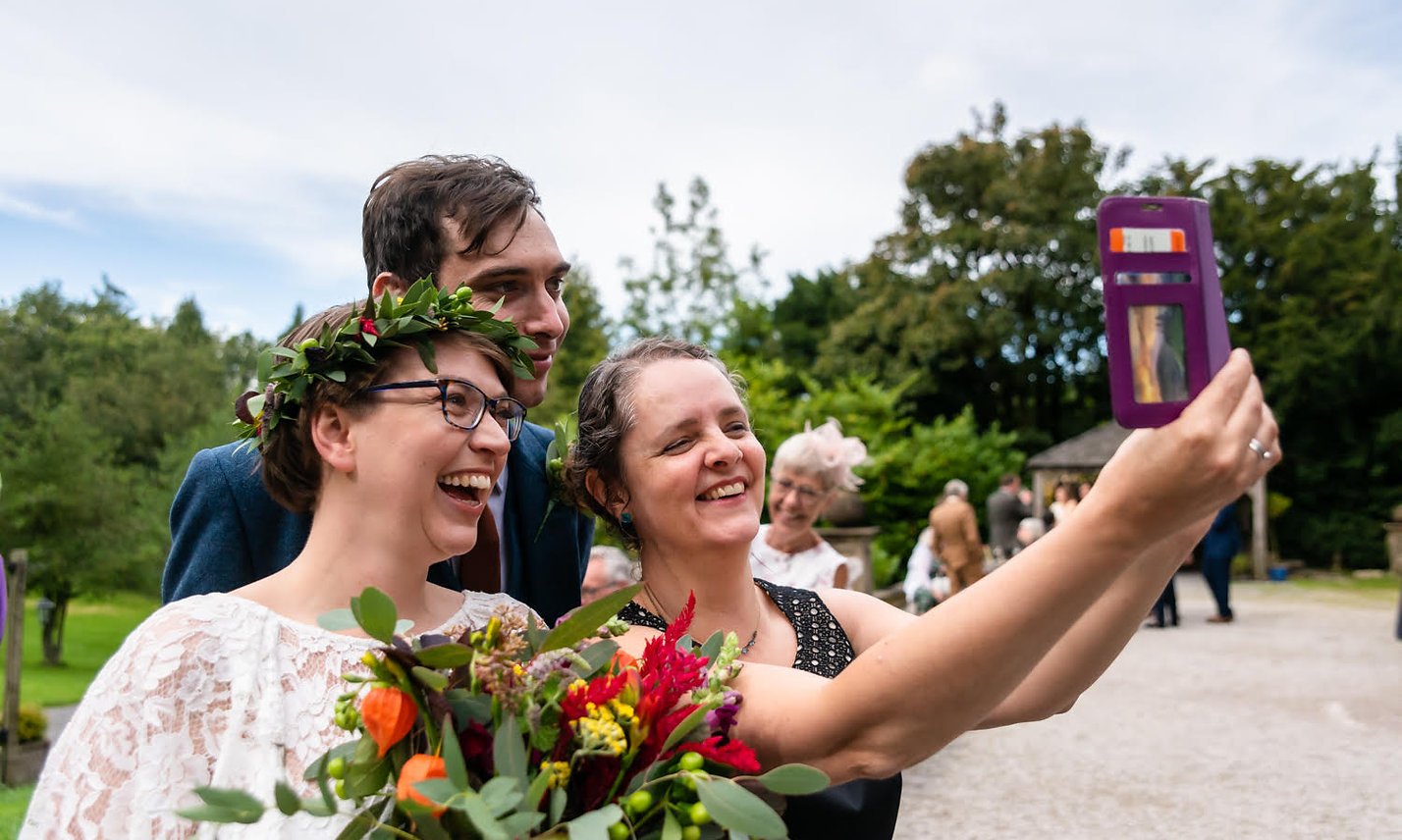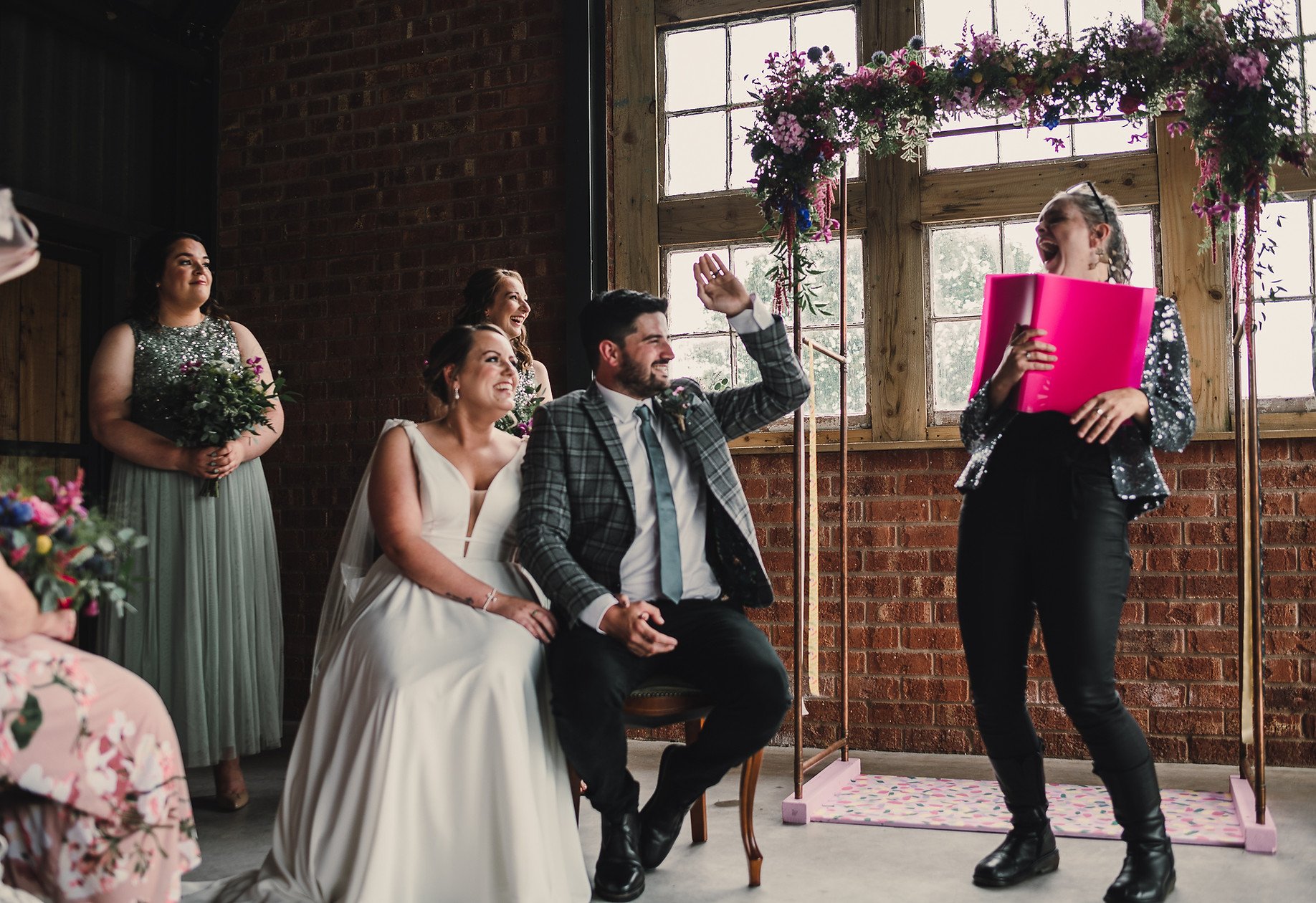Sophie Colligan: An Education and Welcome from Coalition Member, Celebrant and Your New Friend
This is not a coming out story.
This is a welcoming you in story.
Photo by Marni V Photography
Meet Sophie Colligan: she’s a Queer Wedding Celebrant who identifies as neurodivergent. She has walls painted a glorious shade of pinky-purple and the first thirty minutes of our instantaneous friendship are lost to time as we don’t get around to the formal interview—and recording it for my later reference—half an hour into our Zoom meeting. Instead, she pops off her sofa, toting her device around as she shows me the art on her new walls and tells me some of the backstories. We touch on her life changes and what the new apartment means—it’s a two bedroom, but after many years in a safe and meaningful marriage that was, nonetheless, not right for her, she now lives alone. She invites me to Liverpool to break in her guest bedroom, encouraging my spouse to tag along! Sophie extends the invitation sincerely and I sincerely intend to take her up on the offer some day soon.
We chat about her Queer Women’s Walking Group, which she attends in conversation-provoking T-shirts. She conducts short seminars on the inclusion of trans women and non-binary members of the community into the group of mostly middle-aged cisgender lesbians as they trek. We briefly ruminate on how generationally the Queer community can be incredibly divided and we both glow with pride to think of the next gen. It’s hard to think of what we’ve both missed out on by being born before the millennium; kids are now living out and decreasing the stigma of adolescent neurodivergent spectrum diagnosis. As a balm to that pain of lost time, Sophie is reliving the 80’s through her wardrobe and style choices, experiencing the Queer adolescence and young adulthood she was denied. It’s a reclamation of joy and worth celebrating, which is what Sophie does best! But when I ask the first of my formal questions: who are you? Sophie becomes one of the only people I’ve ever interviewed not to say her name and title first.
“I am a bit of a sassy Northerner,” she says to me by way of formal introduction.
She then introduces herself by the intention of profession rather than its purpose. “I really love being able to tell peoples’ stories in their own voice as far as possible and in the way that they want. When I say their story, [it’s] not just their narrative, but what makes them work in a really honest way.” What does she love about celebrant-led ceremonies bespoke nature? “…The guests, the couples, believe in the marriage from the word go,” she tells me. She’s also a Celebrant-trainer. “[I] really encourage them to find their voice as well to make sure there’s a really wide variety [of Celebrants] for couples to choose from,” she says of her efforts to continue diversifying the field. She next self-identifies as neurodivergent and an ADHD-er. I tell her that the term “self-identifies” isn’t strictly necessary; as a fellow ADHD-er with a pandemic-produced diagnosis, I don’t know anyone neurotypical who willingly diagnoses themself as neurodivergent. Still, she’s waiting on a referral and wants to proclaim her self-diagnosed status; as she’s been waiting a long time for an appointment, I realize this differentiation is actually vital to draw attention to the dearth of mental and cognitive health services currently available in this country.
“I’ve been around neurodivergent people a lot—I was a teacher before I became a celebrant. Thirteen years working with autistic, dyslexic, ADHD kids and [I] felt at home. I saw it as liking the honesty of the kids because there wasn’t the filter that there is with neurotypical people,” she reminisces. “One of my best mates is autistic with ADHD,” Sophie says. I’m a bit horrified, though not altogether shocked, that the diagnoses for her friend came at the ages of 37 and 49. The friend has set up a platform called The Future is ND and there Sophie learned how gendered the criteria for diagnosis are and “—how I’ve been keeping hidden, presenting a much more accepted presentation. People saw me as really organized and thorough, but I knew behind the scenes it was chaos and procrastination—late nights and last minutes—I used to think it was all on me,” she says of the burden of trying to operate as neurotypical with a neurodivergent brain. The guilt began to alleviate once she became self-aware. “Well, if I’ve procrastinated all day that’s my neurological wiring,“ she says in a show of self-validation.
Photo by Thomas Demol Photographie
She’s found that working as a Celebrant has its rewards and disadvantages for her mind; working part-time hours suits her neurology, leading to better quality of work now that the chronic overwhelm is being put to rest. However, the financial realities of a self-employed person working only part-time hours can be bleak in comparison to her neurotypical peers. It’s one of the first points of injustice we touch on that briefly incites her anger and rightfully so.
We delve a bit more into themes of injustice as Sophie continues my education into the UK’s discriminatory matrimonial practices. “I chose to be a Celebrant because I wanted to create really meaningful non-religious spaces and experiences that…celebrate our life milestones. And it’s very important to me as an individual to be able to do this without religion.”
“I don’t believe being non-religious is superior to being religious, but I think it should be seen as equal.”
“Church of England, Quaker and Jewish couples can be blessed and seen as married without the government.” And Catholics? I’m curious given how deeply the chasm divides these two sects of Christ-led faiths. “It’s not the priest who does the legal bit,” Sophie tells me with a quirk in her eyebrow like, can you believe it? I cannot.
Photo by Esme Whiteside Photography
It goes without saying that the intersection of racial and religious discrimination has found a root here—those who fall outside of this narrow definition of religious acceptability are seen as unworthy or incapable, in the eyes of the law, to perform and officiate wedding ceremonies within their own communities. With the absence of Celtic Paganism and the aforementioned Catholicism, these are religions that both originated outside the United Kingdom and are still practiced by mostly non-white British citizens. I need to know: have there been any shifts towards justice? “Humanists UK has been challenging the governments for years now—the challenge is that it is discriminatory to give religious couples a privilege over non-religious belief systems, such as Humanism. It has been declared as discrimination in the court of law—it will happen at some point, we just don’t know when,” she says. Within the week a petition is shared with me to protest this very discrimination and I am still following the case through Parliament.
It’s this deep awareness and eagerness to educate that makes Sophie Colligan an obvious choice for the Most Curious Coalition, founded in 2021 before the March 2022 Most Curious Wedding Fair, to aid in making the space a more intentionally inclusive one. “I really, really value being part of the Coalition because it is so refreshing to be with so many people who believe in the same thing—it’s not just the belief[s] we have, it’s the steps we take,” she acknowledges that Nova Reid set the bar with the Nu Bride Wedding Fair before leaving the weddings world to become a full-time anti-racism activist. Sophie participated in Nova’s anti-racism course and the module on shame changed her forever. “It kind of,” she attempts, before beginning again, this time precise with her assessment: “I wouldn’t have come fully into my identity without surrendering that shame,” she shares with me.
“Standing on the shoulders of Nova is what I feel is Becky and Most Curious are trying to achieve—this sense of everyone intentionally being included,” Sophie says.
“I’m really fussy on wedding fairs that I attend. I would only go to ones where I would hope the type of couples I enjoy working with go to,” she tells me, sharing her feeling that while many wedding fairs don’t intentionally seek out or promote a standard couple, it’s through the language and branding of their fairs that those same people will be drawn, seemingly justifying and incentivizing the continuation of that familiar identity of “skinny, able-bodied, cis-het couples.” Sophie trusts that at Most Curious she won’t find something different as a tokenized gesture, she’ll simply meet all the people who have been underserved by that cycle and will be able to continue her work of celebrating a wide range of couples and their diverse narratives.
Photo by Rachel Burt Photography
Her goals for the Coalition revolve around her identity as an educator; she’s found that by welcoming people to celebrate her own narrative, her journey to her Queerness and towards an acceptance of her neurodivergence, that “the strength of talking from lived experience” will lead to authentic education for those in the industry. “I think the one thing I would want to see happen is for anyone who is a big voice or a leader in the wedding industry to educate themselves, but pay to be educated on anti-racism and diversity and inclusion in that order. Because I think it’s too easy to think ‘oh, I’m one of the good guys’ and not dig deep and I think if people haven’t gone through a period of discomfort of recognizing bias—racism, ableism, homophobia—in themselves, then they’re still carrying it unconsciously.”
“If you’re a leader…if you’ve got a big voice, then you need to be unpicking stuff.”
Speaking of her private experiences of education as a Celebrant-trainer, her face lights up. “What I am seeing—I’m really excited by the new celebrants coming in—ahead of the game, [ahead] of the people who are training them. They are already effecting change from the ground level,” she says, pride written across her face.
One of the ways Sophie has led the production of this year’s Most Curious Wedding Fair, was by suggesting a tour of The Truman Brewery be available for suppliers and attendees alike for ease of transition into the new experience. Even if you’re neurotypical, this accommodations is a part of our daily lives in the age of social media. For instance, can you imagine booking an AirBnB without first viewing the photos? Or planning a roadtrip without viewing the route in your maps app? This accommodation is becoming a tacit aspect of our daily routines, but for those of us who are neurodivergent, it can be an inconsistent accommodation.
“I just think if you are making a wedding fair that is accessible to disabled, neurodivergent people then you’re making it accessible to everyone without those identifiers or labels,” Sophie tells me, emphatically.
I completely agree! A more accessible society by its very nature roots out hindrances for all its citizens.
Sophie has found that her neurology has leant itself to her chosen career of Celebrant. “Even before I began identifying with ADHD, I attracted neurodivergent couples because I’m honest and clear with my process and I created a process that would suit me, so it will suit them…if I sense that someone wants very clear communication I will naturally call upon my education background to speak to them. I find the balance between what I need and what they need.”
Photo by Lottie Elizabeth Photography
“What I’ve learned about being a celebrant is what questions are difficult for couples so they have time to process those ahead of time and [I have] created activities for them to do themselves—without me—on shared values,” she tells me, pulling out the props that clearly and visually explain the communication-based “homework” she gives to all her couples. While I marvel at the activities, a living testimony to the creative, thoughtful and passionate mind of their creator, Sophie continues to gently educate me. “Some autistic people might be more comfortable with the written word, [but] I don’t actually do written questionnaires.” Instead, she invites her clients to work with her self-described “boob diagram,” upon which the couple will individually sort through a short list of values provided by Sophie and assign them somewhere within the pair of overlapping circles. “That’s magic for me,” she says, gently setting the activity out of frame. “I love the planning meeting with my couples. A lot of Celebrants rely on questionnaires and they work well for them and I think that’s why it’s important as celebrants that we’re clear about how we work.” Non-script-based communication would be a value she shares with her couples. She would place it on the overlapping point of her boob diagram. “I won’t be alone as a Celebrant in couples telling me that it’s really brought home to them why they’re getting married. [Through the activity] they hear things from each other that affirms them.”
It’s no surprise to me, given the tour of her new home and my envy of its beautiful walls and art collection that Sophie has a background in art. I encourage her that she should continue to find ways of incorporating her art into her Celebrant work. She tells me that she would make backgrounds unique to each couple for them to be married in front of if she wasn’t performing ceremonies.
Why not do both? I ask.
“Why not both?” she replies with a laugh, comfortable with the ways her identity as a Celebrant will continue to change and grow with her as she comes into her own and welcomes more and more people in.
“I am now at a stage where I don’t need to beg for this work and I’m just myself and if [the couple] want it, they want it and if they don’t, they don’t,” she tells me.
She recently thought she’d gotten herself into hot water after saying something a bit cheeky during an initial consultation with a couple, neither of whom are Liverpudlian or necessarily familiar with the trademark sense of humor of the region. Instead, the groom-to-be replied, “‘That’s so Liverpool that!’ And they booked me!”
Photo by Jade Maguire Photography
She strives for that level of authenticity in her work, from first call to final ceremony write-through and in her work as an educator. “One song I played the other night—working to meet a deadline—marking assignments, worst part of training—I played one track over and over all night and I also had a timer on for every fifteen minutes to stop me from daydreaming—representation matters,” she says with a wink to the camera, somehow knowing I was going to include this bit in the profile. “I cannot work and think if there’s any words in the songs—I listen to Steve Reich over and over—one song, oh hold on,” she tells me, adamant that she’ll find the name of this particular piece that gets her in the right space to work.
“TELEPHONE AND RUBBER BAND, PENGUIN CAFE ORCHESTRA!” she practically screams the name when she comes across it and I rush to write it down. A few weeks later, I write this profile to the wordless instrumental track that reminds me profoundly of our first chat. Before we part, I ask what attendees of the upcoming Most Curious Wedding Fair can expect when meeting her at the show. “Couples will be able to get a feel for me—imagining who they want up at the front, telling their story—who feels closest to [how] a friend would, but a friend with that professional experience of crafting a ceremony,” she says.
Cassandra Lane Photography
When I think of Sophie, I think of a friend.
Friendships are vital to her. She sets down her device one more time, searching briefly for an important piece of her story. “I couldn’t remember who I’d told, so I started writing it down,” she flips through a rather plain, but worn standard-sized journal. Names flash before me—so, so many names—of those she has welcomed into her life by sharing her identity. “I don’t mind being identified as a member of the community, or as Queer,” she tells me, head bobbing along in assent with her words. This precious artifact of her narrative and process of welcoming in those she trusts with her identity may bear my own name after today—and now yours too. Meet Sophie, she’ll make a friend out of you quicker than you can say “welcome.”








